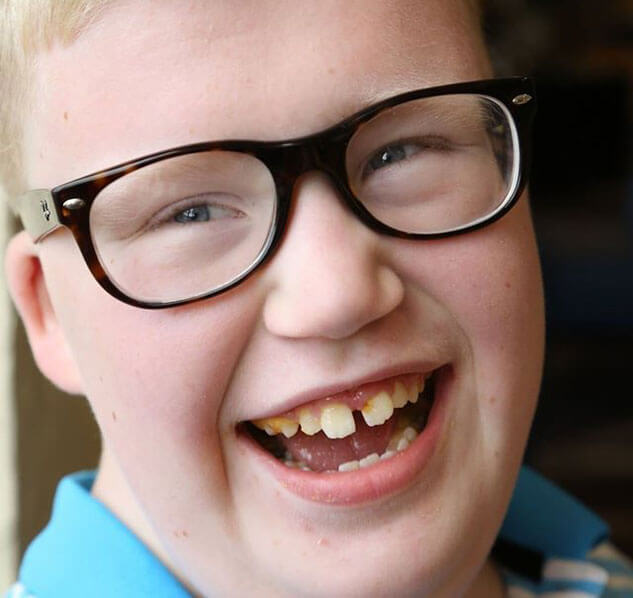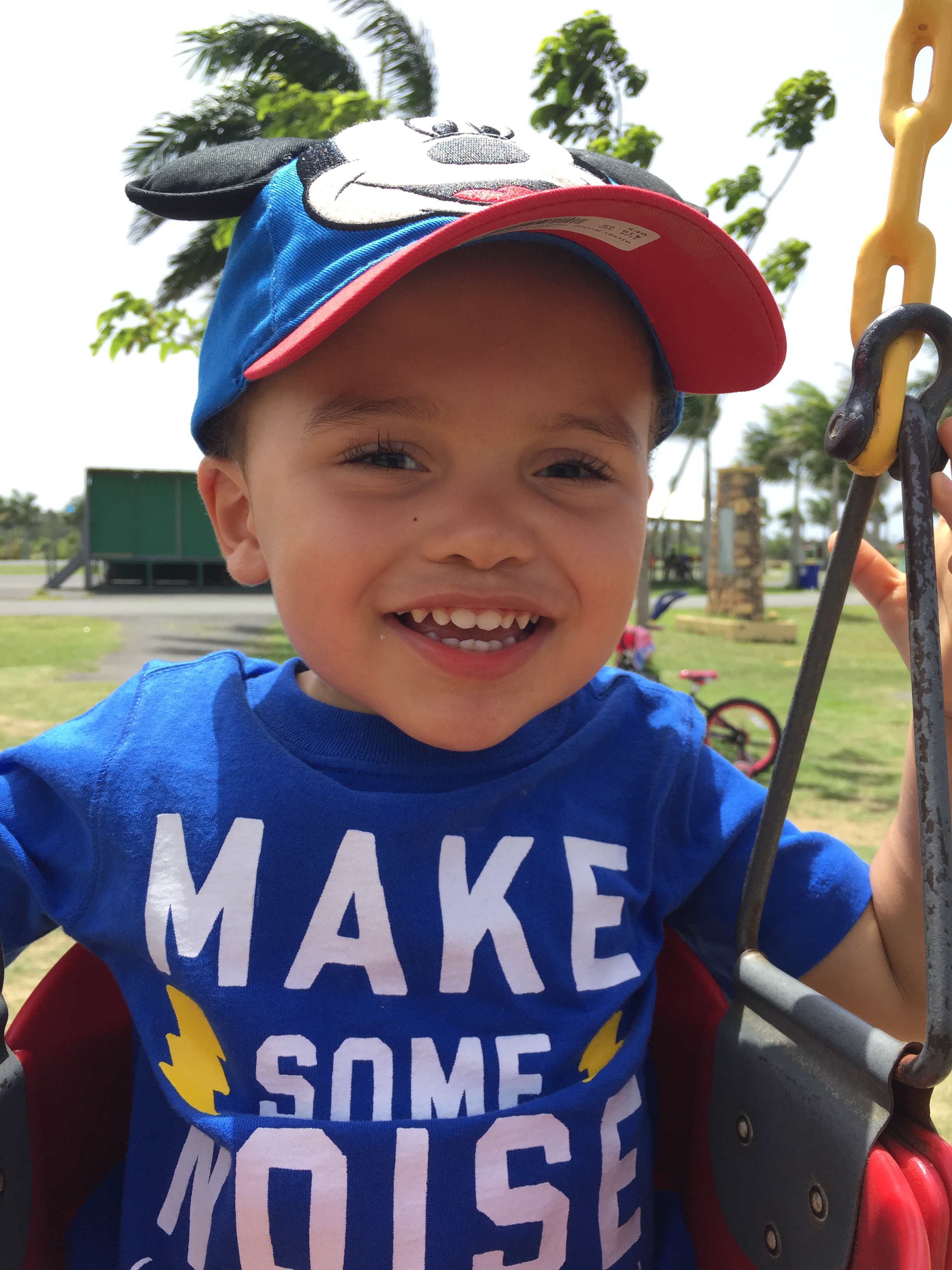Guidelines for Medication Use in SMS patients
Persons with Smith-Magenis Syndrome exhibit a distinct pattern of physical and behavioral features, which may require medical interventions. Varied approaches to managing these features should be considered, including the management of diet, exercise, (including outdoor activities), and therapeutic supports, (therapeutic horseback riding, music therapy, social activities and positive behavior supports). In addition to these approaches, prescription medication may be necessary to help reduce agitation and manage behavioral challenges.
The management of the wide range of behavioral issues in children and adolescents with SMS is particularly challenging for parents, caretakers and health professionals. In addition to the clinical and neuropsychiatric manifestations of SMS, sleep disturbances associated with a reversal of melatonin secretion are a hallmark. The sleep disturbance seems to aggravate behavioral issues such as impulsivity, aggression, hyperactivity and frequent temper tantrums.

While the physical features and molecular genetic causes of Smith-Magenis Syndrome have been well characterized,
there is little research on the efficacy of psychotropic medications in the treatment of the many behavioral co-morbidities (including cognitive impairment, learning disabilities, obsessive compulsive symptoms, anxiety, and depressive symptoms) associated with this complex genetic disorder. There are no published clinical trials on the use and effectiveness of psychotropic medications such as psycho-stimulants, antipsychotics, anti-epileptics and anti-depressants in children with SMS. The single extensive report that reviewed psychotropic medication use in a large cohort of 62 patients with SMS (58% female) was a retrospective study; it asked parents to “recall” and rate their child’s experience with particular medication(s) grouped into seven main drug categories: (1) stimulants; (2) antidepressants;(3) antipsychotics; (4) sleep aides; (5) mood stabilizers; (6) alpha 2 agonists; and (7) benzodiazepines (Laje et al, 2010, Pharmacological Treatment of Disruptive Behavior in Smith–Magenis Syndrome).

In this study, no specific medication or medical class as a whole showed consistent success. Only the benzodiazepine group showed a mild detrimental effect. Medication usage was higher among females, across all medications. Compared to other medication classes in this study, sleep aide use was began in early childhood (~4y). Based on known severity for maladaptive behaviors, early use of stimulants and alpha 2 agonists followed by age 7 years, with benzodiazepines and mood stabilizers, anti-depressants and anti-psychotics by age 9 (Laje et al., 2010). This early use of all medication categories is consistent with the reported limited effectiveness of each one alone and the observed use of poly-pharmacy and/or serial trials. Lacking SMS specific recommended medication approaches, clinicians must rely principles for medical management and knowledge and experience using different medication classes/groups in children.
Many medications have not been tested in children.
Some medications are “off-label,” meaning they were initially tested only in adults and are used in children because they have been found to be helpful. To further compound the complicated issues surrounding the effective use of psychotropic medications, poly-pharmacy is typically necessary in order to treat the wide array of psychiatric symptoms. Use of multiple medications increases the need for an understanding of the usefulness and side effects of drug-drug interactions and which drugs may amplify or reduce the effects of other drugs.
Medical Marijuana/CBD products – there have been no published studies on the efficacy or safety of medical marijuana or CBD products for the treatment of behavioral problems. PRISMS cannot comment on any medication without adequate data (efficacy and safety).
Some of the challenges that may be addressed with medication include:
- Aggressive Behaviors, (self-injury and/or aggression towards others)
- Attention Deficit Disorder
- Social anxieties
- Sleep issues
- Seizures
- Constipation
- Gastric reflux
Persons with SMS may experience less intensity of the issues listed above with the proper use of certain medications. Please refer to your child’s provider to address, monitor and prescribe any medication. Always alert your provider to any side effects or concerns when using any prescription or over-the-counter medication.
Only one medication change at a time should be made
All medications should be started at as low a dose as possible and increased to therapeutic range using a schedule recommended by the provider. It is extremely important that your child be monitored closely when starting a new medication and when adjusting dosages. This is true for both over-the-counter and prescribed medications.
Goal
The goal is to have the patient at a dose of medication, which provides them with a benefit without unacceptable side effects. Most side effects lessen over a few weeks after a new medication is started. The prescriber should make dose adjustments carefully and in close partnership with families and caregivers. A medication log should be kept whenever your child is given any new medication. Free medication logs are available online or can be obtained from your medical provider.
 Any log should include:
Any log should include:
- The start date of the medication
- Starting dose
- Schedule (i.e., how many times a day and time it is taken)
- Date of any dose change and new dose
- Tracking of the specific self-injurious behavior of concern like hand biting
- Note any side effects you believe may be related to medication and document sleep specifically
Medical applications for Android and iOS are also readily available and may be useful for the tech-loving SMS population.
Problems for which medication may be prescribed:
Anxiety
Anxiety medications can include antidepressants as a first-line treatment, since they positively affect brain chemicals, such as serotonin, which reduces both anxiety and depression. Antidepressants have the added advantage that they are non-addicting, and not controlled substances like the anxiolytic Xanax@. There are also anti-anxiety, non-controlled medications such as Buspirone, especially indicated for anxiety and these are well tolerated in children.
When starting anti-anxiety medications, it is not uncommon to experience a dull headache, upset stomach, or jitteriness during the first week. These side effects should not be allowed to progress to severe headaches, migraines, vomiting, diarrhea, or extreme anxiety or restlessness, including an inability to sleep. An important caution is that if there is any worsening of symptoms and/or suicidal thoughts or behaviors, the prescribing provider should be notified immediately.
Principles for medical management
Ongoing medication management includes:
- Obtaining lab work requested by your provider.
- Keeping all follow-up appointments.
- Being sure that all of your child’s providers are aware that he/she is on an antidepressant to avoid receiving an additional serotonin-based drug.
- All medications are started at low doses and increased slowly.
It is important to know that unlike antibiotics, these medications do not start working overnight and may take up to 4-6 weeks before seeing improvement. During the first few weeks, closely monitor your child for side effects and ability to tolerate the new medication.
Attention Deficit Disorder
Attention Deficit Disorder Medications for attention deficit disorder include both stimulants and non-stimulants and affect specific chemicals in the brain known as neurotransmitters, which are responsible for attention and focus. These include: dopamine, and the catecholamines norepinephrine and epinephrine. Non-stimulants include Guanfacine, Clonidine, and Strattera. Well known stimulants such as Ritalin, have been prescribed for attention deficit since the 1960’s.
When a patient is taking a stimulant it is important to watch for a decrease in appetite, weight loss (with or without change in appetite), palpitations, chest pain, increase in blood pressure, decreased linear growth, insomnia, or any new onset or worsening of tics. It is important to remember that these medications are generally well tolerated, but monitoring helps to keep the incidence of side effects manageable.
A pre-medication work-up may be required such as, a complete blood count (CBC), comprehensive metabolic panel (CMP), thyroid-stimulating hormone (TSH), and an electrocardiogram (EKG). Teacher/parent assessment forms may help to document attention issues and validate the diagnosis of attention deficit (with or without hyperactivity). The issue of stimulant abuse is a real concern for patients with previous or current drug abuse problems and this includes misuse by family members or friends with substance abuse problems. Patients on Guanfacine or Clonidine need to be monitored for dizziness, drowsiness, fainting, slow heart rate, and constipation. In two SMS patients Strattera had significantly negative impacts on sleep resulting in hospitalization, so it is not recommended as an alternative for SMS patients at this time.

Ongoing medication management includes:
- Obtaining lab work requested by your provider.
- Keeping all follow-up appointments.
- Being sure that all of your child’s providers are aware that he/she is on a stimulant/non-stimulant medication for attention deficit disorder.
- All medications are started at low doses and increased slowly and the medication is increased until symptoms are improved without any side effects.
- It is extremely important for your child to be monitored closely when starting a stimulant medication and adjusting the dosages when weight, height, and blood pressure are adversely affected.
Aggression
The medications presently preferred by providers for aggressive behaviors are the second-generation antipsychotics. These medications have been FDA approved for autism-related (a comorbid diagnosis for most SMS patients) irritability and have been found to be helpful in addressing both behavioral disturbances and impulse control issues in children and adolescents.
Patients on these medications are monitored closely for increased appetite, weight gain, increased lipids, increased blood pressure, increased blood sugar, and motor movement problems. Other side effects include dizziness, drowsiness, insomnia, nausea, vomiting, constipation, headache and orthostatic hypotension. “Do Not Miss” symptoms include seizure activity and prolonged motor movement problems. In patients with Tardive Dyskinesia, Dystonia and Neuroleptic Malignant Syndrome, these medications can be fatal. It is extremely important to understand the symptoms for these conditions as explained by your healthcare provider. These medications will be prescribed based on the benefits outweighing the risks, and when other alternatives such as behavior modification techniques have not been successful. A pre-medication work-up may be required such as, a complete blood count (CBC), comprehensive metabolic panel (CMP), thyroid stimulating hormone (TSH), prolactin and an electrocardiogram (EKG).
Ongoing medication management includes:
- Obtaining lab work requested by your provider.
- Keeping all follow-up appointments.
- Being sure that all of your child’s providers are aware that he/she is on an antipsychotics medication for aggression.
- All medications are started at low doses and increased slowly and the medication is increased until symptoms are improved without any side effects.
- It is extremely important for your child be monitored closely when starting antipsychotic medication and adjusting the dosages when weight, height, and blood pressure are adversely affected.
It may be helpful to notify your child’s teacher that your child is taking this medication due to the possible side effects of drowsiness/dizziness – associated behaviors may be mistaken as elicit substance use by school personnel.
Some seizure medications may used for behavioral management to decrease aggression and stabilize mood and these include Topamax, Lamicital, and Depakote.
Sleep Disorder
Sleep issues such as insomnia can be very distressing for both the child and parent. The first recommendation is to institute good sleep hygiene. This includes a consistent bedtime, quiet/non-stimulating activities, use of white noise or a rhythmic sound, such as a fan for relaxing, and a cool/dark room (if possible). A recommended progression in medication management starts first with melatonin (not to exceed 3 mg; so it is out of the system by the next day) then benadryl → clonidine → trazadone → quetiapine. 
Melatonin is a hormone that is naturally produced in the body. Monitor for increased heart rate, hypothermia, confusion, and depression. Benadryl is an antihistamine that is commonly prescribed for insomnia. Monitor for excessive daytime sleepiness, dizziness, dry mouth, and urinary retention. Clonidine is also used for insomnia due to its sedating properties. Monitor for dizziness, drowsiness, fainting, slow heart rate, and constipation. Trazadone is an antidepressant that produces pronounced drowsiness and sedation, therefore it is primarily prescribed for insomnia. Quetiapine is an antipsychotic medication that is also very sedating. At low doses it is prescribed to treat insomnia. Open label trials using b1-adrenergic antagonist (beta blocker: acebutolol) has shown efficacy for use in SMS (deLeersnyder et al,. 2001). This approach targets the inverted circadian melatonin rhythm, a hallmark finding in the syndrome. The combination use of a morning beta blocker coupled with administration of an evening dose of melatonin helped to restore circadian plasma melatonin rhythmicity, decrease daytime sleepiness, improve daytime behavior, and enhance sleep in children with SMS (DeLeersnyder et al., 2006). Assessment of pulmonary and cardiac status should be pursued prior to initiating B-blocker use and it should only be used in conjunction with nighttime melatonin.
Ongoing medication management includes:
- Obtaining lab work requested by your provider.
- Keeping all follow-up appointments.
- Being sure that all of your child’s providers are aware that he/she is on a medication for attention sleep disorder.
- All medications are started at low doses and increased slowly and the medication is increased until symptoms are improved without any side effects.
- It is extremely important for your child be monitored closely when starting a sleep disorder medication and adjusting the dosages if weight, height, and blood pressure are adversely affected.
Seizure Disorders
Seizure disorders are treated primarily with anti-epileptic drugs (AEDs) and AEDs may also be used to help with mood stabilizing and behavior management. These medications are given with the goal of controlling the frequency and severity of seizure activity, which may be damaging to the brain. These medications are closely monitored for drowsiness, dizziness, skin rash, tremor, irritability, serious abnormal blood tests and elevated liver enzymes. Topamax is also monitored for the formation of kidney stones and tingling in the hands and feet. In addition, Zarontin prescribed for Absence Seizures is monitored for hyperplasia (overgrowth) of the gums. If your child has a seizure disorder you should find out the type of seizure they have and what the medication options are for treating that seizure type.

Ongoing medication management includes:
- Obtaining lab work requested by your provider.
- Keeping all follow-up appointments.
- Being sure that all of your child’s providers are aware that he/she is on a medication for attention sleep disorder.
- All medications are started at low doses and increased slowly and the medication is increased until symptoms are improved without any side effects.
- It is extremely important for your child be monitored closely when starting a sleep disorder medication and adjusting the dosages if weight, height, and blood pressure are adversely affected.
It may be helpful to notify your child’s teacher that your child is taking this medication due to the possible side effects of drowsiness/dizziness – associated behaviors may be mistaken as elicit substance use by school personnel. Some anti-epileptic drugs (AEDs) require drug-levels to be monitored, however, many do not.
For children that have the risk of prolonged seizures (longer than 5 minutes) or loss of consciousness, an emergency medicine called Diastat may be ordered for the parents to keep on hand at home and at school.
Gastric Reflux
Medications for gastric reflex are recommended or prescribed to reduce the production of stomach acid. Reflux of acid in the esophagus and throat and can cause irritation, cough, sore throat, and aspiration pneumonia if it enters the lungs. H2 Antagonists (such as ranitidine available over-the-counter) and proton pump Inhibitors (PPIs) (such as omeprazole) are the most effective in reducing acid production. Patients taking these medications are commonly monitored for headaches, dizziness, diarrhea, constipation, nausea, vomiting, and constipation.
Ongoing medication management includes:
- Adhering to any dietary and lifestyle modifications.
- Keep all follow-up appointments.
PPIs should not be used for prolonged periods as they may interfere with absorption of nutrients and ultimately lead to an increased risk of fractures. It is also important to discuss the relationship of any medications used for reflux to other medications the patient is taking as they typically should not be taken at the same time as other medications since they may impact the absorption of other medications.
Constipation
Constipation can be an ongoing problem for any SMS patient and may be worsened by medications that have anti-cholinergic side effects. Constipation can be managed using dietary as well as OTC and RX medications. It is important to make sure your child has a good intake of fiber and water in their daily diet. Good sources of fiber include fruits (apples, berries, dried fruits, pears, prunes, kiwi), vegetables (broccoli, carrots, brussels sprouts), whole grains, beans, oatmeal, nuts, and air-popped popcorn. Drinking plenty of water is also essential.
There are also over-the-counter (OTC) and prescription medications available. OTCs include Smooth-Move tea, stool softeners and laxatives such as Colace, Sennosides, Milk of Magnesium, Citrucel, glycerin suppositories, and mineral oil mixed in juice. Your provider may also prescribe a laxative such as lactulose. Please remember to consult with your child’s health care provider before using any OTC, or engaging in frequent use.


